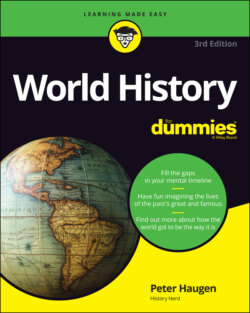Читать книгу World History For Dummies - Peter Haugen - Страница 76
Making Alexander great
ОглавлениеThe Greeks’ fierce, contentious independence made them vulnerable over the period between 359 and 337 BC as a king to their north, Philip of Macedon, used a combination of military force and aggressive diplomacy to muscle in on successive city-states. Macedon (the Macedonian region of modern Greece) wasn’t a mighty empire like Persia, but a small, mountainous country. Yet the Greeks failed to unite against Philip. He conquered, coerced, and negotiated peace treaties with individual city-states until he was in position to set himself up as protector of Greece. Philip formed the city-states into a league that helped his son put together the biggest empire yet.
Philip planned to lead the Greeks against Persia as payback for Persia’s invasions of more than a century before, but he was murdered before he could mount the expedition. Some historians say that his wife, Olympias, paid the killer so that her son, Alexander, could succeed his dad. Nineteen-year-old Alexander, well educated in war and philosophy (one of his tutors was the Athenian philosopher Aristotle), joined her in killing other candidates for the throne of Macedon.
His power at home secure, Alexander quickly disabused the Greeks of any notion that they would have an easy time resisting him, nearly destroying Thebes in the process (not to be confused with the ancient Egyptian capital also called Thebes).
Director Oliver Stone’s 2004 film Alexander, starring Colin Farrell in the title role, is an ambitious attempt to trace Alexander the Great’s entire life, from his difficult relationship with Philip and his complex feelings for his mother through his greatest conquests and beyond. As always with movies, it’s more entertainment than education.
